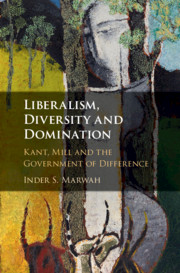Crossref Citations
This Book has been
cited by the following publications. This list is generated based on data provided by Crossref.
Marwah, Inder S.
Pitts, Jennifer
Vasko, Timothy Bowers
Ince, Onur Ulas
and
Nichols, Robert
2020.
Empire and its afterlives.
Contemporary Political Theory,
Vol. 19,
Issue. 2,
p.
274.
Williams, David
2021.
John Stuart Mill and the practice of colonial rule in India.
Journal of International Political Theory,
Vol. 17,
Issue. 3,
p.
412.
Ruffing, Margit
2021.
Kant-Bibliographie 2019.
Kant-Studien,
Vol. 112,
Issue. 4,
p.
623.
Barrell, Callum
2021.
History and Historiography in Classical Utilitarianism, 1800–1865.
LEDERMAN, SHMUEL
2022.
Representative Democracy and Colonial Inspirations: The Case of John Stuart Mill.
American Political Science Review,
Vol. 116,
Issue. 3,
p.
927.
Deslauriers, Théophile
2022.
Maturity and individuality in the later writings of J.S. Mill: a unified account.
History of European Ideas,
Vol. 48,
Issue. 5,
p.
536.
2022.
Ugly Freedoms.
p.
181.
2022.
Ugly Freedoms.
p.
37.
Haderer, Margaret
2022.
Does emancipation devour its children? Beyond a stalled dialectic of emancipation.
European Journal of Social Theory,
Vol. 25,
Issue. 1,
p.
172.
2022.
Ugly Freedoms.
p.
77.
Valdez, Inés
2022.
Toward a Narrow Cosmopolitanism: Kant’s Anthropology, Racialized Character and the Construction of Europe.
Kantian Review,
Vol. 27,
Issue. 4,
p.
593.
2022.
Ugly Freedoms.
p.
148.
2022.
Ugly Freedoms.
p.
113.
2022.
Ugly Freedoms.
p.
207.
Marwah, Inder S.
2022.
White Progress: Kant, Race and Teleology.
Kantian Review,
Vol. 27,
Issue. 4,
p.
615.
2022.
Ugly Freedoms.
p.
1.
Wolf, Brianne
2022.
Adam Smith’s Cosmopolitan Liberalism: Taste, Political Economy, and Objectification.
Polity,
Vol. 54,
Issue. 4,
p.
709.
ARLEN, GORDON
2023.
Liberal Plebeianism: John Stuart Mill on Democracy, Oligarchy, and Working-Class Mobilization.
American Political Science Review,
Vol. 117,
Issue. 1,
p.
249.
Barker, Chris
2023.
Troubled Hedonism and Social Justice: Mill and the Epicureans on the Ataraxic Life.
Utilitas,
Vol. 35,
Issue. 1,
p.
54.
Manioudis, Manolis
and
Yiardoglou, Dimitra
2024.
J.S. Mill and the Indian land question: From the political economy of small proprietorship to the support of ryots and British Imperialism?.
The British Journal of Politics and International Relations,
Vol. 26,
Issue. 2,
p.
408.



